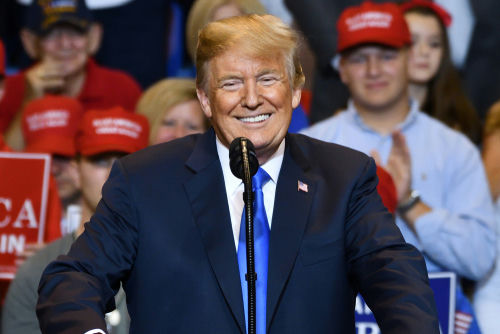President Trump’s sweeping 2025 immigration crackdown is triggering alarm over unprecedented government overreach and the erosion of constitutional protections for American citizens.
Trump’s 2025 Immigration Overhaul: Unprecedented Actions and Rapid Policy Shifts
In early 2025, President Trump’s second administration launched a sweeping overhaul of federal immigration policy, moving with historic speed to fulfill campaign promises of border security and mass deportation. Within days, the administration issued executive orders and policy changes that closed the southern border, restricted humanitarian relief, and established a national emergency. Officials set an ambitious goal to deport one million immigrants annually—more than triple previous records—by expanding expedited removal and relying on local law enforcement as a force multiplier. These actions have already sparked legal battles and widespread concern among constitutional advocates, state officials, and conservative legal scholars.
https://www.youtube.com/@RileyMoorePress
Beyond removals, the administration has dismantled discretionary programs for Dreamers and refugees, cut off Temporary Protected Status for hundreds of thousands of long-term residents, and suspended refugee admissions indefinitely. New data-sharing agreements between federal agencies, including the IRS and ICE, and daily fines for non-compliance have intensified fear and uncertainty in immigrant communities. These measures are intended to deter illegal immigration and restore the rule of law, but critics warn they risk sweeping up lawful residents and chilling participation in essential services, undermining trust in government institutions.
Major Legislation: The “One Big Beautiful Bill Act” and Its Far-Reaching Implications
On July 4, 2025, President Trump signed the “One Big Beautiful Bill Act” (OBBBA) into law—a sweeping measure that fundamentally transforms federal immigration enforcement and benefits policy. The law immediately allocates $45 billion for expanded detention, quadrupling the annual ICE budget and enabling indefinite family detention, including for young children. OBBBA also eliminates access to health care and food assistance for many lawfully present immigrants and their children, stripping millions of the Child Tax Credit and other anti-poverty supports. These changes have triggered alarm among constitutional conservatives concerned about federal overreach, economic consequences, and the long-term impact on family stability and community cohesion.
Medical and mental health professionals have condemned the expansion of family detention, citing “psychological trauma and long-term mental health risks” for children and families. The law’s provisions proactively sidestep longstanding judicial protections, such as the Flores Settlement, raising concerns about due process and basic humanitarian standards. Critics argue that this level of centralized federal authority not only endangers vulnerable populations but also challenges the constitutional limits on government power—a core concern for advocates of limited government and individual liberty.
Federal-State Power Struggles and the Erosion of Local Authority
President Trump’s executive actions in 2025 have put unprecedented pressure on state and local governments to enforce federal immigration law, using threats of funding cuts and civil penalties to force cooperation. Policies now allow local police to participate in federal immigration enforcement, including through the expansion of controversial 287(g) agreements. Jurisdictions that resist have faced the loss of federal funds and even criminal prosecution for officials, igniting debates about federalism and the traditional role of states’ rights. Conservative leaders who value state sovereignty are expressing concern that, while strong enforcement is necessary, the federal government must not trample on local authority or the Constitution’s balance of powers.
“Honoring Patrick J. Buchanan with the Presidential Medal of Freedom would recognize his role as one of the truest patriots of the past century.”
Read more about my letter urging @POTUS to award the Presidential Medal of Freedom in @amconmaghttps://t.co/SaklCgDYpJ
— Rep. Riley M. Moore (@RepRileyMoore) August 22, 2025
Legal challenges are mounting as states and localities push back against what they describe as unlawful mandates and overreach. The administration’s aggressive posture has created political rifts within the conservative movement, with some supporting hardline tactics and others warning of the dangers posed by unchecked executive power. This moment represents a critical test of constitutional governance, with far-reaching implications for the nation’s legal and political landscape.
Constitutional Concerns, Conservative Values, and America’s Future
While many on the right support strong borders and the restoration of law and order, the 2025 immigration crackdown is raising urgent questions about the limits of federal power and the protection of individual liberties. The erosion of due process, the expansion of detention, and the targeting of local authority have fueled concerns that, in the pursuit of security, the government risks undermining the very constitutional principles conservatives hold dear. As the administration moves forward, vigilance will be essential to ensure that American values—personal freedom, family stability, and the rule of law—are not sacrificed in the name of enforcement. The coming months will determine whether this new era of immigration policy strengthens the nation or sets dangerous precedents for government intrusion and overreach.
Sources:
Project 2025: What’s At Stake for Immigrants’ Rights
The Trump Administration’s 2025 Changes to Immigration Law …
The First 100 Days of the Second Trump Administration
The Anti-Immigrant Policies in Trump’s Final “Big Beautiful Bill …
Trump’s 2025 Travel Ban: Who Is Affected and What It Could Cost …

